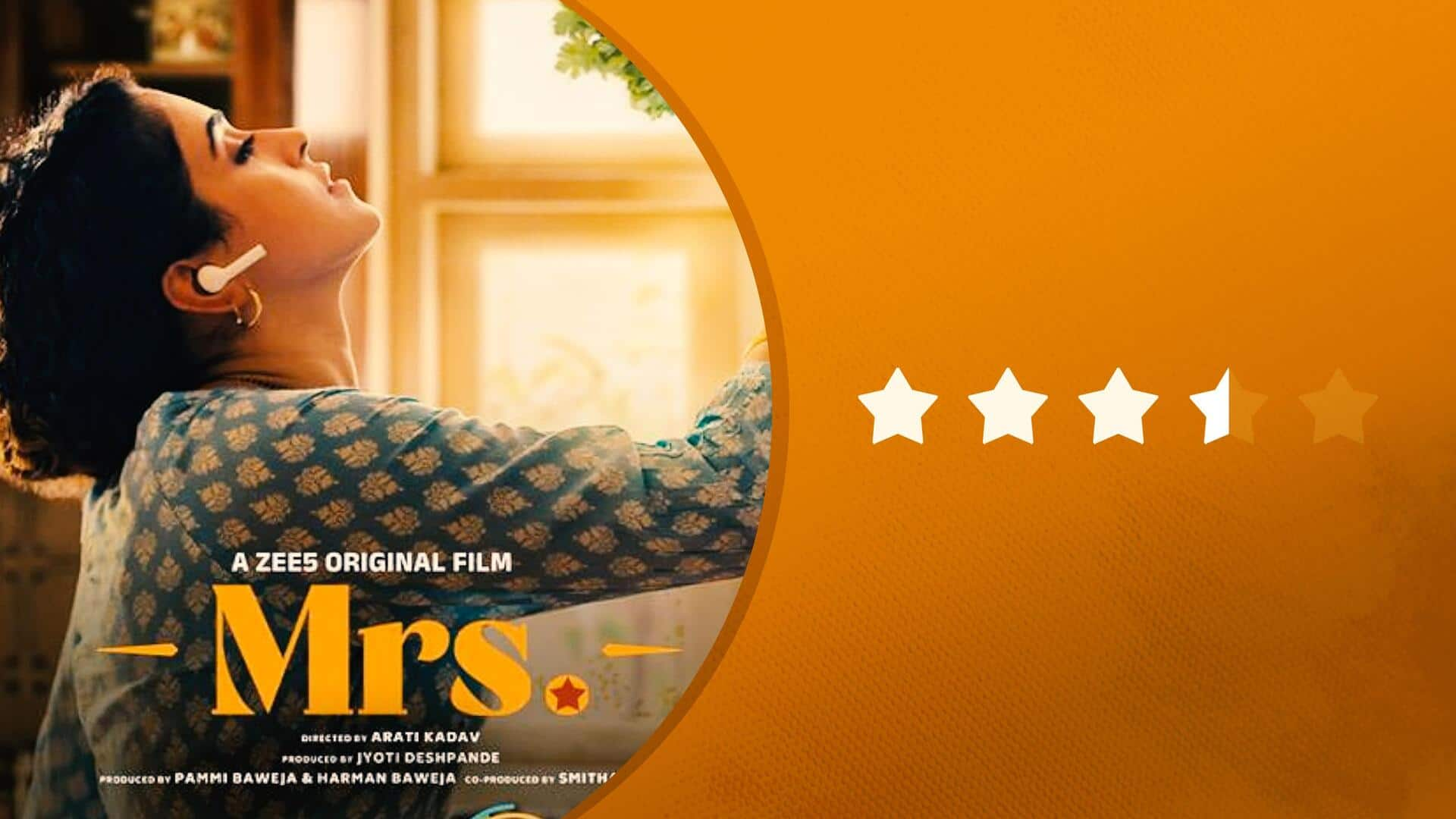
'Mrs.' review: Sanya Malhotra leads must-watch feminist drama
What's the story
Sanya Malhotra's Mrs., which will arrive on ZEE5 on Friday, is an adaptation of the Malayalam film The Great Indian Kitchen (2021).
Just under two hours long, it's incisive, poignant, intelligently made, and well-acted, and lays bare the sexism intrinsically embedded in nearly all Indian homes.
With its sharp, searing dialogues and Malhotra's charged performance, Mrs. makes a strong case for itself.
Story
Follows a newly-married woman and her confrontation with sexist in-laws
The film follows a young, newly wedded woman named Richa, played by Malhotra.
Following her arranged marriage, she begins living with her husband Diwakar (Nishant Dahiya) and his parents, but her fairytale marriage soon turns into a nightmare.
Diwakar's family essentially reduces her to a slave who cuts, grinds, cooks, and cleans 24*7, robbing her of any dignity, independence, and dreams.
Will Richa rebel?
#1
What does the title tell us about the film?
The Great Indian Kitchen pulled a smart move by not naming the central characters (and thus depicting that this is a universal story), and director Arati Kadav does something similar here.
The very title—Mrs.—strips the protagonist of any identity of her own, and her marital status eclipses all her achievements, erodes nearly all of her past, and casts a gloomy shadow over her future.
#2
It's on point with its representation of sexism
The subtle sexism brushed under the carpet in homes is brought to the fore by Mrs.
Diwakar is a gynaecologist—he understands women's bodies but not them—and his toxic masculinity prevents him from becoming a better husband.
Another such scene is when Diwakar's father introduces his daughter.
"She is married to a doctor," he says.
Once again, a woman is defined solely by her husband.
#3
Doesn't shy away from calling out society's hypocrisy
Mrs. has an excellent source story, so it replicates most groundbreaking scenes from The Great Indian Kitchen, with some tweaks and culturally relevant changes here and there.
One such change is the inclusion of a scene about Karvachauth.
What better way to expose the facade Indian society builds for itself than a "festival" where women, mostly, are rendered no choice or agency?
#4
Malhotra doesn't disappoint in any sequence
Malhotra is the beating heart of the film and gradually goes from being cheerful, bubbly, excited, and innocent to seething with rage and pent-up anger.
Like clockwork, Richa wakes up before her husband and sleeps after him, and Malhotra captures the anger and ache of women trapped in such misogynist systems extremely well.
The screen drips with her disappointment and discomfort.
#5
Pay attention to where you mostly see the characters
Another striking aspect is the segregation of spaces within the home.
We see the men enjoying recreational activities, going out, and relaxing in the living room, while Richa and her mother-in-law are almost always confined to "their" kitchen.
The mother-in-law, once a victim of this systemic abuse, now perpetuates it, showing how she submits herself to patriarchy without perhaps realizing it.
#6
What's the worth of a woman's labor?
Mrs. cannot be analyzed completely without commenting on the food imagery.
Cooking is an art form that should be enjoyed, but it becomes a labored chore, a mechanical task, so much so, that you're repulsed each time Richa cooks (or is forced to cook) a new dish.
This endless, thankless toiling in the kitchen distances herself from the art form she actually enjoys: Dance.
#7
Areas where it could have been better
There was immense scope to try something new, but the film largely takes the tried-and-tested route and repeats most of the scenes from The Great Indian Kitchen.
A deeper understanding of Richa and dialogue-heavy scenes could have helped the movie, too.
Moreover, Richa is a dancer, so the film needed at least one memorable song, but the film lets the opportunity slip by.
Verdict
Don't miss it; 3.5/5 stars
Mrs. will be a slow-burning, delectable film if you haven't watched The Great Indian Kitchen, but a revelation just the same if you have watched (and loved) the original.
Like Laapataa Ladies, this is a film that must spark discussion, make you squirm in your seat, and encourage you to fix the misogyny in your home before time runs out.
3.5/5 stars.